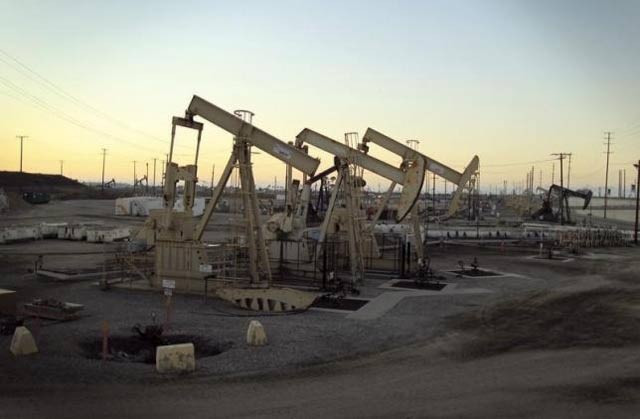Regulator against giving free hand to oil companies
It is feared that deregulation will give OMCs a sudden windfall

PHOTO: REUTERS
Ogra - the industry regulator - wanted the government to continue the existing mechanism established to set profit margins of OMCs and dealers based on the Consumer Price Index (CPI), they said.
Petrol and diesel are the two most widely used petroleum products and it is feared if OMCs and dealers are given a free hand, they will join hands to extract extra money from the consumers by setting higher margins.
Officials pointed out that because of an increase in the consumption of petroleum products, OMCs and dealers were already making hefty profits and the deregulation of margins would give them a sudden windfall.
The deregulation debate erupted after the Ministry of Petroleum and Natural Resources asked the Economic Coordination Committee (ECC) of the cabinet to permit OMCs and dealers to set their own margins on two major petroleum products - high-speed diesel and petrol.
In the first phase, the ministry proposed deregulation of margins on high-speed diesel, which is widely consumed in sowing agricultural crops and transport vehicles. In the next phase, petrol margins will be deregulated to encourage more investment by the industry.
According to officials, Pakistan consumes 600,000 tons of high-speed diesel per month whereas petrol demand stands at 550,000 tons per month. Consumption of petrol is increasing 20% every year after compressed natural gas (CNG) filling stations switched to imported liquefied natural gas (LNG) from domestically produced gas.
At present, OMCs charge Rs2.41 in margins on a litre of petrol and high-speed diesel whereas dealers collect Rs3.16 on petrol and Rs2.67 on diesel.
A senior government official said the Ministry of Petroleum had sent a summary to the ECC, seeking its approval for increasing OMC margins by Rs0.11 per litre of petrol to Rs2.52.
OMCs had, however, demanded a spike of Rs0.18 per litre, which the ministry rejected, saying the demand was higher that could not be accepted. For dealers, the ministry sought an increase of Rs0.14 per litre of petrol.
In the case of diesel, the ministry suggested that instead of revising the margins based on the CPI, these should be deregulated under the government policy of liberalisation and deregulation in a phased manner in an attempt to boost investment, which would result in enhancing the oil storage capacity in the country.
After assessing its results, in the next phase, the margins on petrol would also be deregulated, the ECC was told.
“Following deregulation, the diesel price will vary from one filling station to another across the country,” an official said.
“People will prefer to buy from the filling stations that offer cheaper and efficient fuel. It will also spark competition among the filling outlets.”
Published in The Express Tribune, June 2nd, 2017.
Like Business on Facebook, follow @TribuneBiz on Twitter to stay informed and join in the conversation.



















COMMENTS
Comments are moderated and generally will be posted if they are on-topic and not abusive.
For more information, please see our Comments FAQ